
Table of Contents
Why are AVRs important for the protection of your appliances?
AVRs are important because it regulates the output voltage supplied to your appliance. This then protects your appliance from damage caused by high and low voltage fluctuations.
Essentially, an AVR prolongs the usage life and reliability of your appliances, which is something we all value!
As the leading AVR manufacturer and AVR supplier in the Philippines, at Panther, we believe it’s important for consumers to understand which AVR best suits their needs before purchasing.
In the Philippines, AVRs come in two types: servo-motor type and relay type.
Today, we’ll discuss the difference between the servo motor type AVR vs relay type AVRs.
The biggest difference is, of course, the price. Servo motor type AVRs are more expensive compared to their relay counterparts.
But there is a reason why it’s more expensive. Depending on your appliance, it might make more sense for you to pay more to ensure the protection of your appliance in the long run.
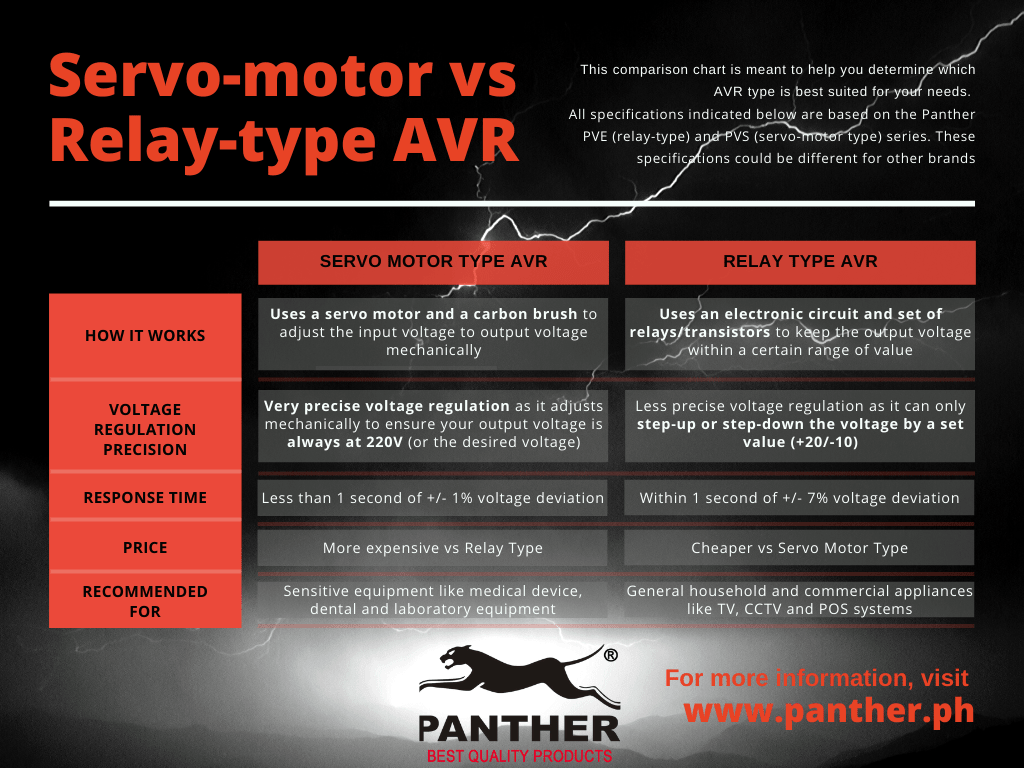
Servo-motor type AVR
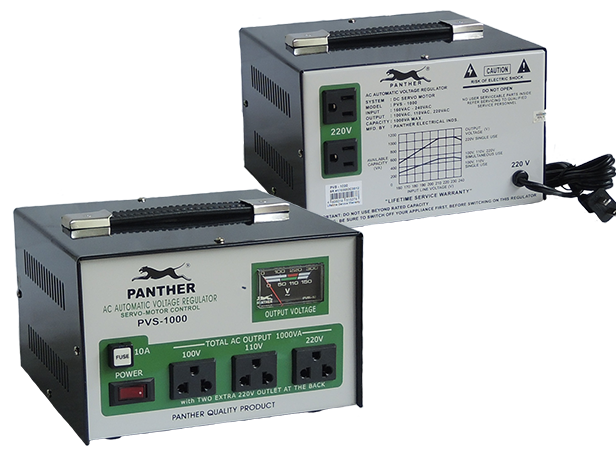
How does a servo-motor type AVR work?
Servo-motor type AVRs makes use of a servo motor and a carbon brush to adjust the input voltage to output voltage mechanically.
Servo-motor type AVR are recommended for sensitive equipment
Sensitive electronic equipment refers to devices that are easily damaged by sudden voltage irregularities. These include devices such as medical equipment, dental and laboratory equipment
Rule of thumb: the more expensive the appliance – the more sensitive the electronic components within. In these case, you may want to invest in a servo-motor type AVR to be safe
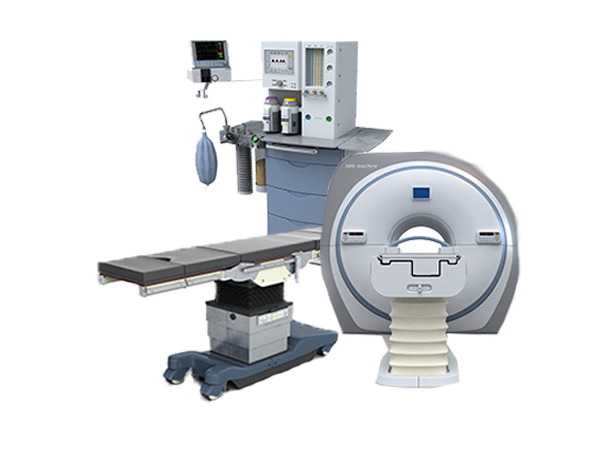
What are the advantages of a servo-motor type AVR over a relay-type AVR?
- The servo-motor type AVR provides more precise voltage regulation compared to relay-types. With servo-motor type AVRs, you are assured of an output voltage that is always at 220V
- The servo-motor type AVR has a faster response time. Expect the servo-motor type AVR to respond within milliseconds of +/- 1% voltage deviation
What are the disadvantages of a servo-motor type AVR over a relay-type AVR?
- Servo-motor type AVRs are more expensive as the servo motor itself costs significantly more versus the electronic components of a relay-type AVR
How long will a servo-motor type AVR last?
If your area experiences frequent voltage fluctuations, you may have to do the following after a few years:
- Get the carbon replaced, as it can get worn out from all the voltage adjustment movement
- Submit your servo-motor for maintenance and calibration to readjust the voltage setting
But don’t worry. Panther provides LIFETIME SERVICE WARRANTY on all Panther products, so you can easily have your carbon replaced and servo-motor AVR recalibrated when that happens.
Relay type AVR

How does a relay type AVR work?
- Relay-type AVRs makes use of an electronic circuit and set of relays/transistors to keep the output voltage within a certain range of value
- Essentially, the electronic circuit compares the input voltage to the desired output voltage. When there is a marked deviation, the circuit switches on the desired relay to connect to the desired output voltage tap
- Every time you hear a click from your relay-type AVR, that’s the sound of the relay switching from one voltage range to another
Relay-type AVR are recommended for general equipment
General household and commercial appliances refer to devices such as TV and stereo systems, CCTV, computer, printer, and POS systems. These are less sensitive to voltage fluctuations, but are still important to protect from damage as they can be pricey to replace
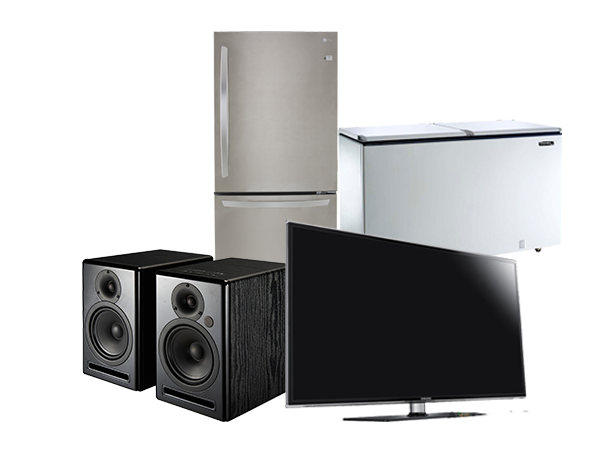
What are the advantages of a relay-type AVR over a servo-motor type AVR?
- Relay-type AVR is made up of electronic components (circuit, relay/transistor). Compared to a servo motor AVR, it is cheaper, lighter and more compact
What are the disadvantages of a relay-type AVR over a servo-motor type AVR?
- Relay types AVR adjusts the output voltage in discrete “steps.” Essentially, when a certain input voltage is registered, the relay will indicate whether the AVR should step-up or step-down the voltage by a set value (vs the servo-motor type mechanical finetuning). This makes it less precise in voltage regulation vs the servo-motor type
- The relay-type AVR has a slightly slower response time: relay-type AVRs will respond within 1 second of +/- 7% voltage deviation. NOTE: 1 second can make a huge difference for extremely sensitive electronic components, so a servo-motor type would be better for very sensitive appliances
How long will a relay-type AVR last?
Similar to servo-motor type AVRs, you may have to get the relay replaced, as it can get worn out from all the voltage adjustment movement (especially if you are in an area with frequent voltage fluctuations)
But don’t worry. Panther provides LIFETIME SERVICE WARRANTY on all Panther products, so you can easily have your relay replaced when that happens.
Interested in purchasing Panther AVRs?
Here at Panther, as a leading AVR manufacturer and AVR supplier in the Philippines with decades of experience, we recognize that each customer may require different types of AVRs depending on their requirement. As such, we currently have three AVR series for you to choose from: PVE, PVR and PVS series
NOTE: All Panther AVR products have switch, fuse/circuit breakers, line/noise filter and lifetime service warranty
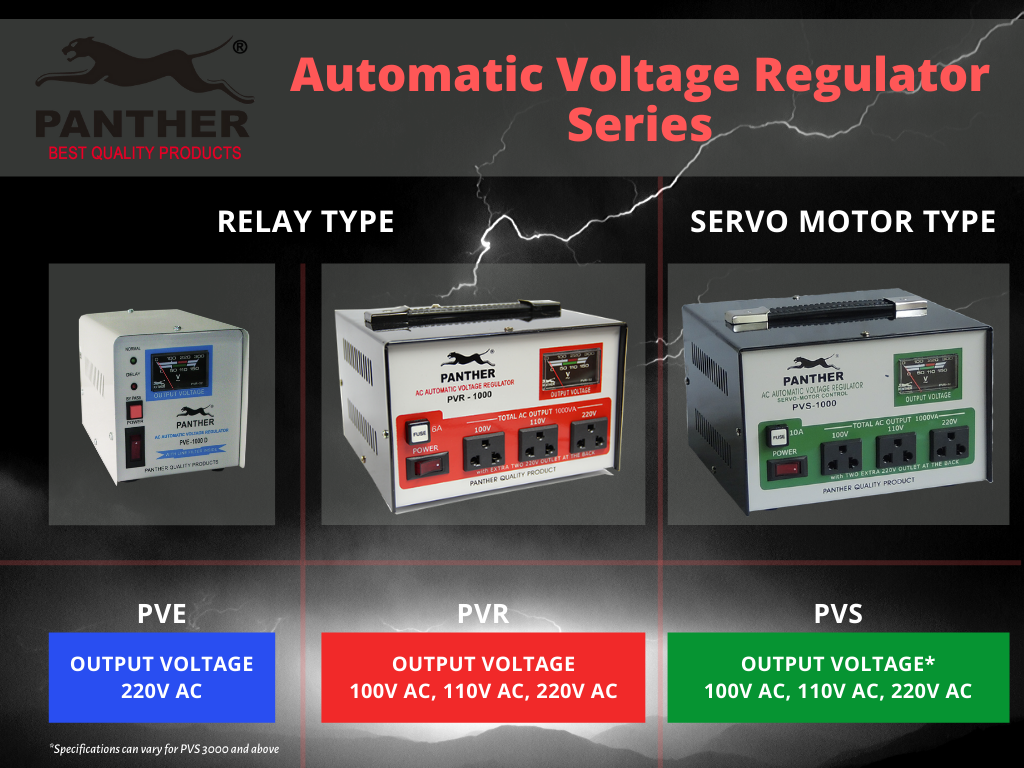
In case you have specific AVR requirements (e.g., AVR type, output voltage, safety features), please contact us directly with the specifications you require and we can manufacture a made-to-order AVR for you
Still Have Questions?
Reading this article should help you figure out the differences between a servo-motor type AVR and a relay-type AVR, in terms of:
- How does the servo-motor type AVR work compared to a relay-type AVR?
- What are the advantages and disadvantages of the servo-motor type AVR when compared to the relay-type AVR?
- How long does a servo-motor type AVR and relay-type AVR last?
Do note that there are also other considerations when purchasing an AVR, aside from determining the appropriate AVR type to use. If you’re interested to know more, check out our detailed AVR buyer’s guide
If you still have questions, feel free to drop a comment below or email us at pantherproduct@gmail.com




what kind of avr is ideal for sound system set up with power amps, processors etc.?
Hi Sir! This is dependent on the power consumption of your sound system setup (this is indicated on equipment nameplate: either in amps or watts), as well as whether your equipment needs 110V or 220V voltage. The important thing is – your AVR capacity needs to be equal to, or greater than the power consumption of all the items.
To better help you, you can email us your product’s specification to pantherproduct@gmail.com / or SMS to (0922) 893 2654 , and we can then provide an AVR recommendation
Hope this helps!
Gud day!is it normal for a servo avr to have a sound or clicking inside?
Good day! For relay-type AVRs, it’s normal to hear clicking sounds. For servo-type AVRs, it’s normal to hear whirring sounds. Both are indicators that the AVRs are functioning, as these sounds occur when the AVR regulates the voltage entering your appliances. If you’d like for us to verify, please take a video of your AVR and send to pantherproduct@gmail.com so we can also provide an assessment. Subject title of email: NAME OF CUSTOMER – ITEM MODEL – ISSUE/QUESTION FACED. Thank you!
Have a nice day, I would like to ask if is it possible to adjust the output of AVR from 220V to 225V or 230V output?
Good day, thank you for your inquiry! Yes, it is possible for us to adjust the AVR output to your desired voltage. However, this will be made-to-order. Kindly email us at pantherproduct@gmail.com your specific requirements so we can provide a quotation, as well as lead time for production. Thank you!
Good day i need an avr for my tv (93w) speaker (30w) and lap top which avr should you recommend? A servo or relay type? How many watts?
Good day, what’s the power consumption of your laptop?
If less than 290 watts, then I’d recommend PVE 500 D: https://panther.ph/product/pve-500-d-relay-type-avr/
If greater than 290 watts, then I’d recommend PVE 1000 D: https://panther.ph/product/pve-1000-d-relay-type-avr/
We hope this helps!
I have a 1.1 KW , 220 V , 60 HZ soft ice cream machine with digital display.Which type of AVR and which capacity / model do you recommend for my use ? How much is it price ? Do you have a dealer in Bacolod to buy in from ? Kindly share your Bacolod deaker contact details and adress.
Good day! Please check your email as we have additional questions regarding your soft ice cream machine device. We have also shared our Bacolod dealer address and contact details via email. Thank you!
Good evening! I installed recently a 1hp Split type carrier aircon (inverter) and wanted to use AVR to safeguard the said equipment. What should be the rated capacity of AVR and what type of AVR. The cooling power is about 2.6 Kw as indicated below;
Power supply : 60Hz, 220-230 V
Cooling apacity:2.60 Kw
Coling Amperes: Indoor- 0.25 – 0.24 ; outdoor-3.60 – 3.46
Cooling Watts: INDOOR-35 -35 ; oUTDDOOR-765 – 765
Good day, given the 1HP aircon specification (as indicated by your aircon specification), we would recommend you consider:
– PVS 3000 (3000 Watts AVR): https://panther.ph/product/pvs-3000-servo-motor-type-avr/
– PVP 3500 (3750 Watts Voltage Protector): https://panther.ph/product/pvp-3500-panther-voltage-protector-3500w-w-power-on-delay/
For a detailed article on the difference between an AVR vs a Voltage Protector, you can check this link: https://panther.ph/difference-between-avr-and-voltage-protector/
Note that both would require you to plug in the aircon to the device. We hope this helps!
I bought 2.5 hp Haier split AC unit.y electric in my home is only 170 – 190 volts. What avr will safely run my new ac?
Good day! Thank you for your inquiry.
For high-powered appliances like a 2.5 HP aircon, we highly recommend you check directly with the aircon manufacturer/supplier for the required max AVR capacity as it is possible they are designed to run at lower power consumption points, therefore a lower rated AVR might suffice.
At normal calculation though, we would suggest you purchase a 5,000 Watts AVR: https://panther.ph/product/pvs-5000-servo-motor-type-avr/
Kindly let us know if you have any questions!
Hi. Good day!
Your website is very informative! Keep it up!
I hope you can help me. I’m looking for an AVR + surge protector-in-one for my PC (with an estimated load wattage of around 370w-400w). PSU is 550w. We seldom experience power fluctuations or outages in our area. Do you have any recommendations? TIA.
Good day! Thank you for reaching out to us, and we’re glad you’ve found our website helpful 🙂
Based on the description of your situation and the desired protection for your PC, we would recommend the PVE 500 (https://panther.ph/product/pve-500-relay-type-avr/)
For more detailed description of the different items and the varying degrees of protection provided, you can check out this article: https://panther.ph/difference-between-surge-protector-vs-avr-vs-ups/
We hope this helps!
That is what I am talking about. bookedmarked indeed!
Good day! We are happy to hear our article was helpful to you. We have tons of other articles that we hope you would also find interesting – here’s a rough table of contents arranged by product: https://panther.ph/buyers-guide/
I have a 299w inverter refrigerator and i used an avr PVE-1500 am i using the right avr?
Good day! Yes, the PVE 1500 should suffice. We normally encourage AVRs with Power-on-Delay feature for refrigerators though, as refrigerators running on freon are particularly susceptible to post-brownout voltage surge damage since it is important for the freon to settle down (~3-5 minutes) after the compressor stops, before the equipment can be safely turned on again. As such, you may want to consider the PVE 1000 D or PVE 1500 D. However, for the purpose of protection from voltage fluctuation – the PVE 1500 is well-suited to do that!
I have 1.1kw 220v 60hz soft ice cream machine. What avr model would you prefer? Thank you
Good day! Kindly let us know the maximum ampere consumption of the ice cream machine 🙂 You can email us at pantherproduct@gmail.com or FB message us at https://www.facebook.com/pantherproducts/
I have a haire semi inverter freezer with a power input of 185 watts. What avr would you recommend.
Email me pls. ralphrgm@gmail.com
Thank you
Good day! Kindly check your email inbox for our response. Thank you!
My AVR output is not anymore 220. It ranges from 235 to 242. Should I replace this unit or just need calibration?
Good day! We would suggest bringing it to the Panther Service Center for assessment. Calibration can be done free or charge under Panther’s Lifetime Service Warranty. Based on our assessment, we can also inform you if additional parts need to be replaced. For more information on how to avail of Panther’s Lifetime Service Warranty, kindly see link: https://panther.ph/lifetime-service-warranty/
What kind of avr should i use if our voltage supply is lower than 110v?
Good day! Is your voltage supply consistently lower than 110V? Around what voltage level? If it’s steady at a certain level, you can consider the Manual Voltage Regulator instead – which has an input voltage range between 85V to 235V AC.
Link to Manual Voltage Regulator: https://panther.ph/product-category/appliance-protection/voltage-protection/manual-voltage-regulator/
However, take note that this is a MANUAL regulator, and is only advisable if the voltage level in your area is consistently low. For more information on when to consider Manual Voltage Regulator, you can check out this article: https://panther.ph/difference-between-an-automatic-voltage-regulator-avr-and-a-manual-voltage-regulator/#when-would-you-choose-a-manual-voltage-regulator
We hope this helps!
Are AVR with 110V output safe to use with heating element type appliances like coffee maker or waffle maker from the US?
Good day! Yes, they should be safe to use provided you purchase an AVR with a built-in step down transformer (so you can use your 110V appliance in the Philippines), and that the AVR purchased is right-sized for your appliance (so that overload will not occur).
To determine the appropriate AVR capacity for your device, you can check out this article: https://panther.ph/how-to-calculate-appliance-capacity-requirements/
For our available AVRs with built-in step down transformer, please click this link: https://panther.ph/product-category/appliance-protection/automatic-voltage-regulator/pvr-relay-type-with-transformer/
I need a 3000w AVR with Servo motor type
To have my Breville 18 000 w 110 v
Good day! Just to confirm, what’s the power consumption of your Breville? Is it 18000 Watts?
Good day! I have an air compressor with 100watts, 220v – 50hz. What AVR do I need that has a the same output? Thanks
Good day! We would recommend the PVE 501 D: https://panther.ph/product/pve-500-d-relay-type-avr/
However, kindly note that your air compressor uses 50Hz frequency, whereas the Philippines used 60Hz frequency, so you may also require a frequency converter. We hope this helps!
10kva servo stabilizer required for industrial use
Good day! Kindly email pantherproduct@gmail.com for your specific requirements, and we can then provide you a quotation suited for your needs. We hope to hear from you!
HI I HAVE A 6 COMPUTER WHAT AVR I BUY
Good day! What do you mean by a 6 Computer? Could you share your computer specifications? For normal computers (e.g. non-gaming), we would typically recommend the following:
a. AVR: PVE 501 – https://panther.ph/product/pve-500-relay-type-avr/
b. UPS (you may want to consider a UPS also, for additional power during a power outage, which will protect your computer from outage damage. Panther UPS has a built-in AVR as well): PUP 501 – https://panther.ph/product/pup-501-uninterruptible-power-supply/
We hope this helps! Alternatively, please do provide us your specific computer specifications so we can provide more accurate recommendations.
My espresso maker (Breville Barista Express) has a wattage of 1,600. I only use this around 10 minutes a day. Do i need an AVR for this. If yes, what AVR type do i need? Thank you
Good day! If you only use it for ~10 minutes a day and keep it turned off the rest of the time, an AVR would likely not be needed (unless your area suffers from high/low voltage constantly). We hope this helps! If you do still prefer to purchase an AVR for additional protection however, kindly let us know the max power consumption (in amperes) and volts used of your Breville Barista Express, so I can help you check. Thank you!
Good day! what’s your recommended AVR for a 178-Watt inverted ref. Many thanks
Good day! So we can make sure we are providing an accurate recommendation, could you provide the ampere and voltage of your refrigerator as well? Thank you!
Good day! My 178-W inverter ref has a rated current of 1.4A and uses 220V. Thank you!
Good day! Based on your refrigerator specifications, we would recommend the PVE 1001 D: https://panther.ph/product/pve-1000-d-relay-type-avr/
We hope this helps!
thank you very much for your recommendation.
You’re welcome! We look forward to serving you for many more years to come!
please , I would like to ask if you have branch in cagayan de oro city , Misamis Oriental.
Good day! Select models/items are available in Welcome Home Depot (Del Monte, QC and Abad Santos, Manila), Handyman, True Value, All Home, Ace Hardware, DIY Hardware, Metro Gaisano, MC Home Depot, Lazada, Shopee and others.
Shopee: https://shp.ee/4is2ysd
Lazada: https://tinyurl.com/LazadaxPanther
Please do message us if you have any questions! Looking forward to your purchase!
Good day Sir/Maam,
I have samsung 2 door ref with specs Rated current :2.0A, Rated power input: 150W, Defrosing Power Input : 310W and i used an avr Panther PVR-1000 am i using the right avr? And i ordered Panther Power delay 1000W.
Good day! Is your refrigerator rated 110V or 220V voltage? This will allow us to provide a more accurate recommendation. Thank you!
220V Sir
Good day! Given the specifications you have provided, the ideal AVR to use would be the PVE 1501 D (includes built-in power-on-delay narin) so you don’t have to use a separate PPD 1000. However, if the PVR 1000 is currently working for you, then pwede rin naman po. Ikabit nalang sa PPD 1000 ang PVR, para may power on delay feature narin. But if lagi pumuputok ang fuse, we would recommend using the PVE 1501 D instead. We hope this helps!
Link: https://panther.ph/product/pve-1500-d-relay-type-avr/
Thank you very much
You’re very welcome! If you have any other questions, please don’t hesitate to ask us. We’d be happy to help!
I have a computer and 2 monitor what AVR I should get? Here are the specs
i5 11400
3060 12gb gaming OC
2x 16GB RAM
3 1TB SSD
1 240gb SSD
3 Case fans
1 185hz monitor
1 60hz monitor
Good day Kurt! To help you determine the right model, please provide wattage of each unit. If the AVR capacity is not sufficient for the power rating of your equipment, the AVR fuse will blow and no power will be supplied to your equipment.
For your reference:
If your equipment’s power rating is above 400 watts, but below 800 watts, you may consider AVR Models: PVE 1001 / PVE 1001 D
If your equipment’s power rating is above 800 watts, but below 1200 watts, you may consider AVR Models: PVE 1501 / PVE 1501 D
If your equipment’s power rating is above 1200 watts, but below 1600 watts, you may consider AVR Models: PVE 2001 D
We hope it helps.